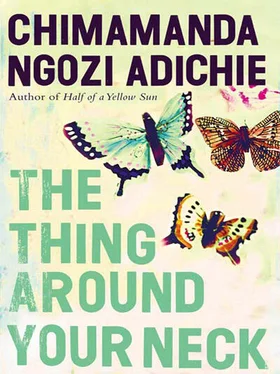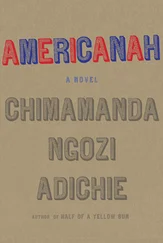The day that the white men visited her clan, Nwamgba left the pot she was about to put in her oven, took Anikwenwa and her girl apprentices, and hurried to the square. She was at first disappointed by the ordinariness of the two white men; they were harmless-looking, the color of albinos, with frail and slender limbs. Their companions were normal men, but there was something foreign about them, too, and only one spoke a strangely accented Igbo. He said that he was from Elele; the other normal men were from Sierra Leone, and the white men from France, far across the sea. They were all of the Holy Ghost Congregation; they had arrived in Onicha in 1885 and were building their school and church there. Nwamgba was first to ask a question: Had they brought their guns by any chance, the ones used to destroy the people of Agueke, and could she see one? The man said unhappily that it was the soldiers of the British government and merchants of the Royal Niger Company who destroyed villages; they, instead, brought good news. He spoke about their god, who had come to the world to die, and who had a son but no wife, and who was three but also one. Many of the people around Nwamgba laughed loudly. Some walked away, because they had imagined that the white man was full of wisdom. Others stayed and offered cool bowls of water.
Weeks later, Ayaju brought another story: the white men had set up a courthouse in Onicha where they judged disputes. They had indeed come to stay. For the first time, Nwamgba doubted her friend. Surely the people of Onicha had their own courts. The clan next to Nwamgba’s, for example, held its courts only during the new yam festival, so that people’s rancor grew while they awaited justice. A stupid system, Nwamgba thought, but surely everyone had one. Ayaju laughed and told Nwamgba again that people ruled others when they had better guns. Her son was already learning about these foreign ways, and perhaps Anikwenwa should, too. Nwamgba refused. It was unthinkable that her only son, her single eye, should be given to the white men, never mind how superior their guns might be.
Three events, in the following years, caused Nwamgba to change her mind. The first was that Obierika’s cousins took over a large piece of land and told the elders that they were farming it for her, a woman who had emasculated their dead brother and now refused to remarry even though suitors were coming and her breasts were still round. The elders sided with them. The second was that Ayaju told a story of two people who took a land case to the white men’s court; the first man was lying but could speak the white men’s language, while the second man, the rightful owner of the land, could not, and so he lost his case, was beaten and locked up and ordered to give up his land. The third was the story of the boy Iroegbunam, who had gone missing many years ago and then suddenly reappeared, a grown man, his widowed mother mute with shock at his story: a neighbor, whom his father often shouted down at age-grade meetings, had abducted him when his mother was at the market and taken him to the Aro slave dealers, who looked him over and complained that the wound on his leg would reduce his price. Then he and some others were tied together by the hands. forming a long human column, and he was hit with a stick and asked to walk faster. There was only one woman among them. She shouted herself hoarse, telling the abductors that they were heartless, that her spirit would torment them and their children, that she knew she was to be sold to the white man, and did they not know that the white man’s slavery was very different, that people were treated like goats, taken on large ships a long way away and eventually eaten? Iroegbunam walked and walked and walked, his feet bloodied, his body numb, with a little water poured into his mouth from time to time, until all he could remember later was the smell of dust. Finally they stopped at a coastal clan, where a man spoke a nearly incomprehensible Igbo, but Iroegbunam made out enough to understand that another man, who was to sell the abductees to the white people on the ship, had gone up to bargain with the white people but had himself been kidnapped. There were loud arguments, scuffling; some of the abductees yanked at the ropes and Iroegbunam passed out. He awoke to find a white man rubbing his feet with oil, and at first he was terrified, certain that he was being prepared for the white man’s meal. But this was a different kind of white man, a missionary who bought slaves only to free them, and he took Iroegbunam to live with him and trained him to be a Christian missionary.
Iroegbunam’s story haunted Nwamgba, because this, she was sure, was the way Obierika’s cousins were likely to get rid of her son. Killing him was too dangerous, the risk of misfortunes from the oracle too high, but they would be able to sell him as long as they had strong medicine to protect themselves. She was struck, too, by how Iroegbunam lapsed into the white man’s language from time to time. It sounded nasal and disgusting. Nwamgba had no desire to speak such a thing herself, but she was suddenly determined that Anikwenwa would speak it well enough to go to the white men’s court with Obierika’s cousins and defeat them and take control of what was his. And so, shortly after Iroegbunam’s return, she told Ayaju that she wanted to take her son to school.
They went first to the Anglican mission. The classroom had more girls than boys — a few curious boys wandered in with their catapaults and then wandered out. The students sat with slates on their laps while the teacher stood in front of them, holding a big cane, telling them a story about a man who transformed a bowl of water into wine. Nwamgba was impressed by the teacher’s spectacles, and she thought that the man in the story must have had fairly powerful medicine to be able to transform water into wine. But when the girls were separated and a woman teacher came to teach them how to sew, Nwamgba found this silly; in her clan girls learned to make pottery and a man sewed cloth. What dissuaded her completely about the school, however, was that the instruction was done in Igbo. Nwamgba asked the first teacher why. He said that of course the students were taught English — he held up the En glish primer — but children learned best in their own language, and the children in the white men’s land were taught in their own language, too. Nwamgba turned to leave. The teacher stood in her way and told her that the Catholic missionaries were harsh and did not have the best interests of the natives at heart. Nwamgba was amused by these foreigners, who did not seem to know that one must, in front of strangers, pretend to have unity. But she had come in search of English, and so she walked past him and went to the Catholic mission.
Father Shanahan told her that Anikwenwa would have to take an English name, because it was not possible to be baptized with a heathen name. She agreed easily. His name was Anikwenwa as far as she was concerned; if they wanted to name him something she could not pronounce before teaching him their language, she did not mind at all. All that mattered was that he learn enough of the language to fight his father’s cousins. Father Shanahan looked at Anikwenwa, a dark-skinned, well-muscled child, and guessed that he was about twelve, although he found it difficult to estimate the ages of these people; sometimes a mere boy would look like a man, nothing like in Eastern Africa, where he had previously worked and where the natives tended to be slender, less confusingly muscular. As he poured some water on the boy’s head, he said, “Michael, I baptize you in the name of the Father and of the Son and of the Holy Spirit.”
He gave the boy a singlet and a pair of shorts, because the people of the living God did not walk around naked, and he tried to preach to the boy’s mother, but she looked at him as if he were a child who did not know any better. There was something troublingly assertive about her, something he had seen in many women here; there was much potential to be harnessed if their wildness could be tamed. This Nwamgba would make a marvelous missionary among the women. He watched her leave. There was a grace in her straight back, and she, unlike others, had not spent too much time going round and round in her speech. It infuriated him, their overlong talk and circuitous proverbs, their never getting to the point, but he was determined to excel here; it was the reason he had joined the Holy Ghost Congregation, whose special vocation was the redemption of black heathens.
Читать дальше











